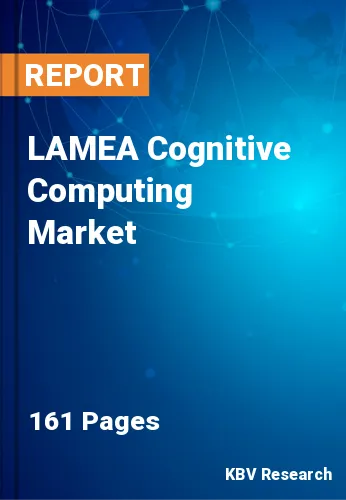The Latin America, Middle East and Africa Cognitive Computing Market would witness market growth of 34.9% CAGR during the forecast period (2023-2030).
Increasing digitization, a rise in the demand for intelligent data processing solutions, and an increase in the uptake of cutting-edge technologies all favorably impact the market trends for cognitive computing. In addition, the increased need for personalization and enhancing the customer experience will open up profitable potential for market expansion. The volume of digitalization has increased, which has increased massive, complicated data. In order to expand cognitive computing solutions, several nations are making strategic investments. This is ascribed to the capabilities of cognitive computing, which integrates various data sources and offers a platform that effortlessly builds up a unified environment. As a result, end users began to use cognitive computing solutions more widely.
The development of the cognitive computing market is strongly impacted by the rising trend of cutting-edge technologies like IoT and other technologies. Demand is mostly driven by radical developments in several industries made possible by communication technologies. In order to promote the implementation of IT and administration systems across various business operators, cognitive computing technologies are becoming increasingly popular. Business managers may increase network availability by using digital solutions more frequently, and they can give technical employees more freedom to perform maintenance tasks effectively.
Cognitive computing development in Latin American nations has gained traction recently. The level of education and research in AI and cognitive computing varies from country to country. Some Latin American universities and research institutions are actively contributing to AI and cognitive computing research. In some Latin American nations, governments have shown interest in promoting AI and related technologies. They are actively collaborating with governments, businesses, and educational institutions to promote the adoption of AI and cognitive computing solutions across various sectors. Hence, the regional cognitive computing market will expand because of the aforementioned factors.
The Brazil market dominated the LAMEA Cognitive Computing Market, By Country in 2022, and would continue to be a dominant market till 2030; thereby, achieving a market value of $4.6 billion by 2030. The Argentina market is anticipated to grow at a CAGR of 35.7% during (2023 - 2030). Additionally, The UAE market would witness a CAGR of 34.6% during (2023 - 2030).
Based on Deployment Type, the market is segmented into On-premise and Cloud. Based on Technology, the market is segmented into Natural Language Processing (NLP), Machine Learning and Automated Reasoning & Others. Based on Enterprise Size, the market is segmented into Large Enterprises and Small & Medium-sized Enterprises. Based on Vertical, the market is segmented into Healthcare, BFSI, Retail & E-commerce, Manufacturing, IT & Telecom, Government & Defense, Energy & Power and Others. Based on countries, the market is segmented into Brazil, Argentina, UAE, Saudi Arabia, South Africa, Nigeria, and Rest of LAMEA.
Free Valuable Insights: The Worldwide Cognitive Computing Market is Projected to reach USD 278.8 Billion by 2030, at a CAGR of 32.3%
The market research report covers the analysis of key stake holders of the market. Key companies profiled in the report include SAP SE, Google LLC, Tibco Software Inc., 3M Company, Microsoft Corporation, SAS Institute Inc., TATA Consultancy Services Limited, IBM Corporation, Hewlett Packard Enterprise Development LP, and Oracle Corporation.
By Deployment Type
By Technology
By Enterprise Size
By Vertical
By Country
Our team of dedicated experts can provide you with attractive expansion opportunities for your business.

